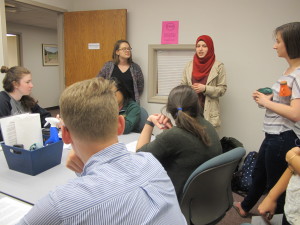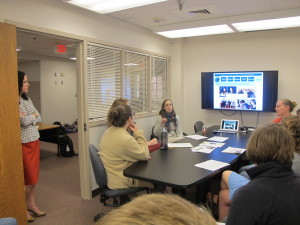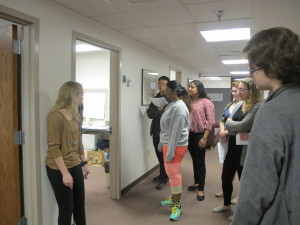Outreach Events
GOVT 301 Research Methods Open House
Date: Wednesday, March 22, 2017
Time: 10:00am – 12:00pm
Place: Social Science Research Methods Center
There will presentations from the SSRMC student staff, PPIR, SNaPP, and STAIR labs. Also, refreshments like coffee and donuts will be provided!
Photos from the Event:
SSRMC Open House
Date: Friday, September 9, 2016
Time: 2:00-5:00pm
Place: Social Science Research Methods Center
 Reveley Visit
Reveley Visit
Date: Tuesday, April 19th, 2016
Time: 4:00pm
Place: Social Science Research Methods Center
On Tuesday, April 19th, the SSRMC welcomed President Reveley for a tour. The dedicated students of the SSRMC showed off all the hard work and research they have done over the year.
Photos from the Event:
GOVT 301 Class Visit
Date: Wednesday, March 23rd, 2016
Time: 10:00-12:00pm
Place: Social Science Research Methods Center
Photos from the Event:
Marketing Research Skills to Potential Employers
Date: Monday, February 22, 2016
Time: 4:00-5:00pm
Place: The Career Center
Join the SSRMC at the Career Center an informational session on how to best advertise what you have learned while conducting undergraduate social science research to the professional world and how to navigate the research-oriented job search process effectively. We will also be Skyping in recent W&M graduates who can give you first-hand advice about using research in post-graduate life.
Career Center Workshop on Marketing Research Experience
The Career Center put together a short presentation on marketing research experience on a resume and Linkedin page and in interviews. This prezi is by no means comprehensive, but it does provide a good synopsis of their advice for these topics. For more information, please see the Career Center’s website, where you can sign up for a mock interview and have your resume reviewed.
SNaPP Lab Career Center Event
Date: Wednesday, April 1st, 2015
Time: 4:00pm
Place: The Career Center
Powerful feelings: Efficacy Beliefs and Political Action on Climate Change
Date: Monday, October 27th, 2014
Time: 12:30pm
Place: Social Science Research Methods Center
Neil Stenhouse, Center for Climate Change Communication, George Mason University Along with other psychological motivations like shared identity and perceptions of injustice, feelings of efficacy have been found to be one of the major factors associated with participation in collective action. There are specific subtypes of efficacy belief, which can be more or less important in explaining different types of behavior. For climate change, which type of efficacy has the most powerful effect on behavior? For those who wish to encourage action, is it more important to convince people that they as individuals are capable of making a meaningful contribution to collective efforts? To convince them that collective efforts will convince politicians to act? Or that the actions politicians take will be effective in stopping climate change? The work Neil is presenting uses confirmatory factor analyses of cross-sectional survey data to test whether conceptual distinctions between different types of efficacy belief for climate change have a psychological reality – whether they each exist as distinct, measurable psychological entities, or whether response items can be better explained as caused by more general latent variables. Using structural equation modeling, he tests how strongly efficacy beliefs are related to self-reported measures of participation in collective action. This work provides an important first step in determining which efficacy beliefs are psychologically distinguishable and potentially influential for complex social problems like climate.



 Reveley Visit
Reveley Visit

















